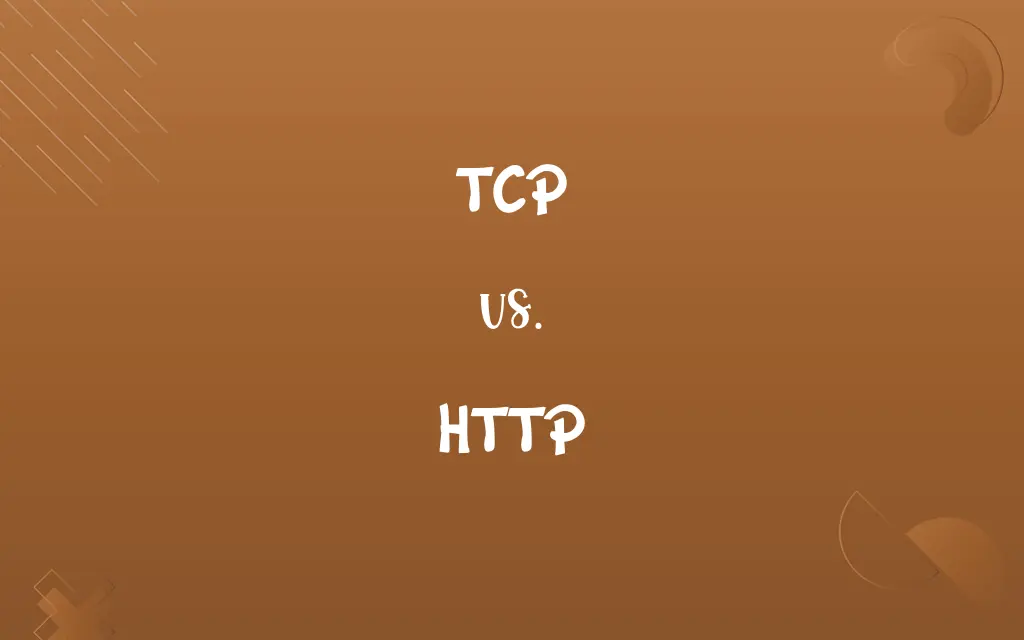TCP vs. HTTP: Know the Difference

By Shumaila Saeed || Updated on February 20, 2024
TCP (Transmission Control Protocol) is a core protocol for data transmission over the internet, while HTTP (Hypertext Transfer Protocol) is an application-level protocol for web communication.

Key Differences
TCP is a fundamental protocol in the internet protocol suite, ensuring reliable, ordered, and error-checked delivery of data between applications. HTTP, on the other hand, is an application protocol used for transferring web documents, like HTML.
Shumaila Saeed
Feb 16, 2024
While TCP operates at a lower level, managing the data transmission between servers and clients, HTTP works at a higher level, defining the commands and services used for transmitting webpage data.
Shumaila Saeed
Feb 16, 2024
TCP creates a connection between a sender and receiver, ensuring that packets of data are delivered accurately and in sequence. HTTP uses this reliable connection established by TCP to exchange web-based information.
Shumaila Saeed
Feb 16, 2024
TCP is protocol-agnostic, meaning it can transmit any type of data, whereas HTTP is specifically designed for the hypertext and multimedia documents found on the World Wide Web.
Shumaila Saeed
Feb 16, 2024
In internet communication, TCP acts as the foundation for various application protocols, including HTTP, which relies on TCP’s underlying features to function effectively in web communications.
Shumaila Saeed
Feb 16, 2024
ADVERTISEMENT
Comparison Chart
Function
Manages data transmission between devices
Transfers hypertext and multimedia on the web
Shumaila Saeed
Feb 16, 2024
Reliability
Ensures reliable, ordered data transmission
Relies on TCP for reliable delivery
Shumaila Saeed
Feb 16, 2024
Usage
General data transmission for various protocols
Specifically used for web document transfer
Shumaila Saeed
Feb 16, 2024
ADVERTISEMENT
TCP and HTTP Definitions
TCP
TCP establishes a connection between sender and receiver before data transfer.
Email services use TCP to establish a secure connection for sending messages.
Shumaila Saeed
Jan 17, 2024
HTTP
HTTP is a protocol used for transmitting web pages over the internet.
Websites are accessed using HTTP protocols.
Shumaila Saeed
Jan 17, 2024
TCP
TCP provides error-checking and preserves the order of data packets.
TCP rearranges data packets received in the wrong order.
Shumaila Saeed
Jan 17, 2024
HTTP
HTTP defines how messages are formatted and transmitted in web communication.
HTTP requests retrieve information from web servers.
Shumaila Saeed
Jan 17, 2024
TCP
TCP manages the sending and receiving of data packets over the internet.
Streaming services rely on TCP for smooth data delivery.
Shumaila Saeed
Jan 17, 2024
ADVERTISEMENT
HTTP
HTTP operates on top of TCP, utilizing its connection-oriented features.
HTTP leverages TCP for reliable web document transfer.
Shumaila Saeed
Jan 17, 2024
TCP
TCP is protocol-agnostic, supporting a wide range of internet applications.
TCP is essential for both web browsing and file sharing.
Shumaila Saeed
Jan 17, 2024
HTTP
HTTP is stateless, meaning each request is independent of the others.
Each click on a web link generates a new HTTP request.
Shumaila Saeed
Jan 17, 2024
TCP
TCP is a core internet protocol that guarantees reliable data transmission.
Secure file transfer uses TCP to ensure data integrity.
Shumaila Saeed
Jan 17, 2024
HTTP
HTTP is the foundation of data communication for the World Wide Web.
HTTP is responsible for loading web pages in a browser.
Shumaila Saeed
Jan 17, 2024
TCP
A protocol developed for the internet to get data from one network device to another;
TCP uses a retransmission strategy to insure that data will not be lost in transmission
Shumaila Saeed
Jan 15, 2024
HTTP
A protocol used to request and transmit files, especially webpages and webpage components, over the internet or other computer network.
Shumaila Saeed
Jan 15, 2024
HTTP
A protocol (utilizing TCP) to transfer hypertext requests and information between servers and browsers
Shumaila Saeed
Jan 15, 2024
Repeatedly Asked Queries
What makes HTTP stateless?
It treats each web request as a separate transaction.
Shumaila Saeed
Feb 16, 2024
How does TCP handle lost packets?
It retransmits them until they are correctly received.
Shumaila Saeed
Feb 16, 2024
Can TCP handle multiple connections?
Yes, it can manage multiple simultaneous connections.
Shumaila Saeed
Feb 16, 2024
Is HTTP used for non-web applications?
Generally no, it's designed for web communication.
Shumaila Saeed
Feb 16, 2024
Can HTTP function without TCP?
No, HTTP relies on TCP for data transmission.
Shumaila Saeed
Feb 16, 2024
What's the difference between HTTP and HTTPS?
HTTPS is the secure version of HTTP with encryption.
Shumaila Saeed
Feb 16, 2024
Does HTTP save data between sessions?
No, it's stateless; each request is independent.
Shumaila Saeed
Feb 16, 2024
How does TCP ensure data integrity?
Through error-checking and sequence control.
Shumaila Saeed
Feb 16, 2024
Does TCP work with protocols other than HTTP?
Yes, like FTP, SMTP, and more.
Shumaila Saeed
Feb 16, 2024
Are there alternatives to HTTP for web communication?
Yes, like SPDY and HTTP/2.
Shumaila Saeed
Feb 16, 2024
Is TCP suitable for streaming media?
TCP is used, but protocols like UDP may be better for real-time streaming.
Shumaila Saeed
Feb 16, 2024
Can TCP be used for real-time communication?
It's less ideal for real-time due to its reliability focus.
Shumaila Saeed
Feb 16, 2024
Share this page
Link for your blog / website
HTML
Link to share via messenger
About Author
Written by
Shumaila SaeedShumaila Saeed, an expert content creator with 6 years of experience, specializes in distilling complex topics into easily digestible comparisons, shining a light on the nuances that both inform and educate readers with clarity and accuracy.









































































